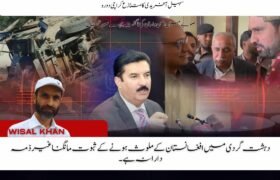Pakistan had to sacrifice more than 90,000 of its citizens including more than 10,000 soldiers and officers in the war against terrorism in this region. In terms of financial losses, hundreds of billions of dollars were lost during the past 2 decades. Pakistan’s armed forces achieved impressive successes against terrorist groups and all major bastions of terrorists were destroyed. Two major military operations, Operation Zarb Azb, in 2014, and Operation Redd ul Fassad in 2017, broke the TTP’s back in Pakistan. However, due to the lack of border fencing, most of the terrorists moved from Pakistan to the safe areas of Afghanistan from where they continued to carry out terrorist activities in Pakistan. In August 2021, the US left Afghanistan and new government of Taliban pledged that it will not allow its soil to be used against any other country.
In this backdrop, IEA government in Afghanistan brought TTP and the state of Pakistan on negotiation table. Pakistan has been in talks with the TTP for some time about surrendering arms and ending violence against the state. The TTP has announced a ceasefire to show its seriousness towards the peace process and some of its members have been released by Pakistan to reciprocate.
In October last year, the then Prime Minister Imran Khan revealed that the talks with the TTP were going on. He said that the talks with the militants were taking place in Afghanistan and the new Taliban rulers were assisting in this process.
Pakistan has decided to give the chance to peace as the US forces have left Afghanistan which used to be the major bone of contention for any peaceful talks in the past. In this regard, a government-led committee consisting of civil and military representatives is negotiating the peace within the bounds of constitution of Pakistan. The final decision will be made with the approval of the Parliament in the light of the Constitution, guidance and, the consensus.
Although military operations have seen success, this is not a lasting solution because many of TTP members are local Pakistani belonging to tribal districts of KP. Pakistan cannot continue to fight the TTP forever as it will only add fuel to existing crisis. Instead, it is wise that the state is trying to dissuade TTP from picking weapons against an Islamic state.
Many people are making false assumptions about peace talks citing these as sign of state’s weakness and compromise on the blood of all fallen soldiers. Nothing can be far from truth than this false assertion. In fact peace talks are being done only for giving chance to all sides to reform and take part in progress of their people and the land so that both the state and the TTP can avoid an endless, and aimless war which is going to benefit only to our eternal enemies in the region.
There is a simple fact which people must understand. War is a political phenomenon. It’s a mean to create an environment where one party can negotiate from a position of strength. This is exactly what state of Pakistan is doing. These negotiations are being done after dismantling the entire infrastructure of TTP and, within the bounds of the state constitution. Such talks, after military phase of conflict, always take place, and it’s evident from history of warfare, even the superpower, the US, had to negotiate with Taliban against whom it fought for 20 years in Afghanistan.
After the US withdrawal from Afghanistan, TTP militants may not get the support they used to. Based on strong assurances from the Afghan Taliban, the situation appears to be in Pakistan’s favor, which bodes well for peace talks.
Peace talks do not necessarily mean that a state is weak or unable to fight with militants or that the state does not face the threat of terrorism anymore. Dialogue does not mean that the state will grant amnesty to all terrorists and militants or that the state will mainstream militants. Reaching a peace deal does not mean that the state will disparage those killed by militants.
The security forces who risked their lives to protect the homeland have proved that the armed forces will always meet the expectations of the nation to defend the homeland, but political efforts should also be made to solve the problem of militancy. Fighting will not bring lasting peace. Pakistan has a success story of peace talks in Baluchistan where some 2000 militants have abandoned violence between February 2016 and December 2017.
An endless conflict is bad for people other than security forces as well. These endless wars turn generations of young minds into violent volcanoes which are almost always exploited by hostile foreign elements.
In this backdrop, it is in Pakistan’s interests that peace is given a chance. The state can revert to kinetic options whenever it decided to but for the sake of rebuild the war torn areas, our looming economic crisis and, to avoid the impact of political meltdown in the country, it is critical that at this point in our history we make peace within and without!




